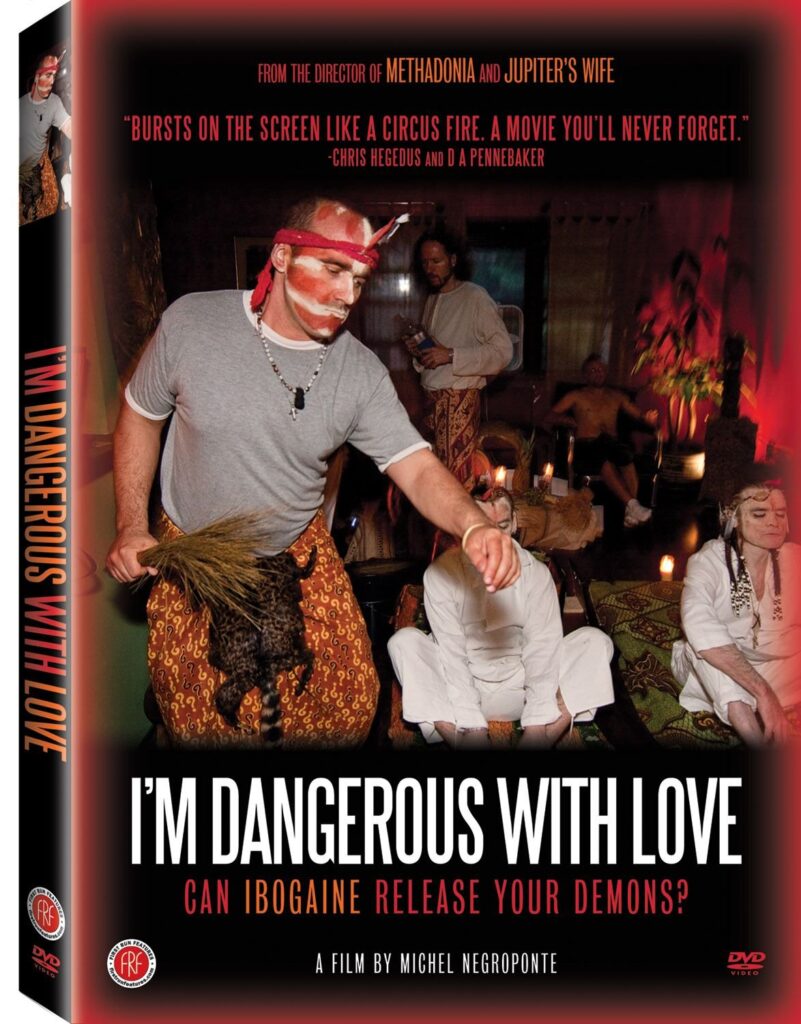
Written by Mary K. Williams
This 2009 documentary is about addiction and redemption. But in this case, redemption is not achieved through talk therapy, prayer, or methadone. Directed by Michel Negroponte, I’m Dangerous with Love is the story about Dimitri Mugianis, a former drug addict and front man of the band Leisure Class, who found a cure to opiate addiction without the horrors of dope sickness and withdrawal.
And what is this cure? Ibogaine. It’s an alkaloid that is found in the root bark of the iboga (tabernanthe iboga) plant. This shrub is common to the jungles of central Africa, and is an integral part of the ceremonies of the Bwiti religion of the same region.
Emmy Award-winning Negroponte has delved into the world of addiction before, with his 2005 documentary, Methadonia. That HBO film told the stories of patients at a New York City methadone clinic, and resulted in a viewer contacting Negroponte about an experimental cure for heroin and other addictions.
Negroponte was hesitant about spending more time in this depressing milieu, but then he started speaking with addicts and former addicts. They pointed him in the direction of Dimitri Mugianis and he was impressed with the man’s intensity and passion.
The “special effects” to portray a trip are disappointing, only if you were expecting something like scenes of images from Requiem for a Dream or Alice in Wonderland, but this isn’t that sort of movie to accompany ingestion of a banned substance. It’s a totally sobering look at desperation and subsequent healing.
Dangerous follows Dimitri as he “pays it forward”, by helping other addicts overcome their dependency on drugs via ibogaine. The film highlights several individuals and their detox experience with Dimitri, and Dimitri’s assorted helpers. One client is a man named Eddie.
At one point during his detox, Eddie commented that his dope-sickness was very, very mild. He noted that if this were a traditional detox, he’d be convulsing, vomiting, sneezing, and a general mess. Days later, we see a different man. He’s calm and lucid, but maybe a bit nervous. During his post-detox interview, he fidgets with his sunglasses, enough that it begins to become distracting. The glasses are repeatedly sliding off his forehead and over his eyes – to leave this in the film seems like an odd editorial choice on the part of Negroponte.
But when these moments are coupled with Eddie’s statements, it becomes almost endearing because he speaks of the need for an addict to have a plan after ibogaine detox. He stressed the importance to get out of the city for at least a week, if possible, and then to have a plan for NA or AA, any and as much support as possible. Eddie’s current responsible and self-possessed style of speaking underscores the potential waste of human intellect and grace that is a part of addiction.
There are similar success stories in Dangerous, all happening in an underground environment. But there comes a session with a young man in Canada who, along with his brother, wants to get off methadone. Their detox is more complicated than usual, and what happens scares Dimitri, enough that he takes time to reassess his mission.
He admits that his ego might be getting in the way, and this echoes his previous statements that even though he’s been clean for several years, he still feels addicted to the chaos, and the illicit nature of his work. He clearly wants to help others, but his most recent troubles in Canada send the message that he needs to get some more expertise before continuing.
So he’s off to Gabon, Africa, where he spends time with the Bwiti, learning from their shamans about embracing the spirituality of ibogaine. In this immersion mission, Dimitri is intent on being fully initiated into the Bwiti religion. To do this requires that he take a massive, beyond therapeutic, dose of ibogaine. The intent is rebirth, and Dimitri goes through probably the most intense trip of his life.
But at the end of this process, he feels much more centered and once back in the U.S. he adds more ceremony to his detox sessions. He wants to not only cure his clients; he wants them to fully understand the spiritual connection. Now, ibogaine is a sacrament in his work. This is a man who expresses astonishment for simple things like gray hair and needing reading glasses, and his gratitude for the natural aging process really hits home.
In the more immediate sense, this film brings awareness to the Ibogaine “cure” for serious drug addiction. But in a larger context, this work has an even more urgent message; patients, providers and governments need to be more in touch with what non-traditional techniques can offer. It’s wonderful that these days acupuncturists and yogis can share the same rental space as dentists and obstetricians, but there are other alternative healing techniques. These alternatives shouldn’t be dismissed, just because there is no FDA regulation, or more importantly, no real money to be made.
Dimitri sums it up best, “we should start listening to the people who wear feathers.”